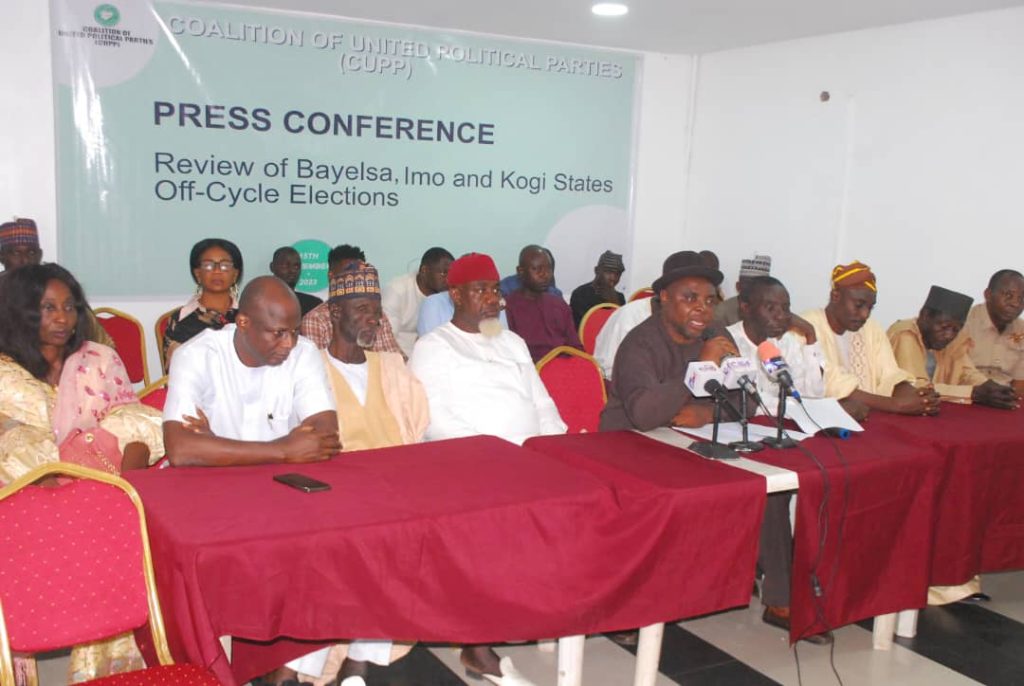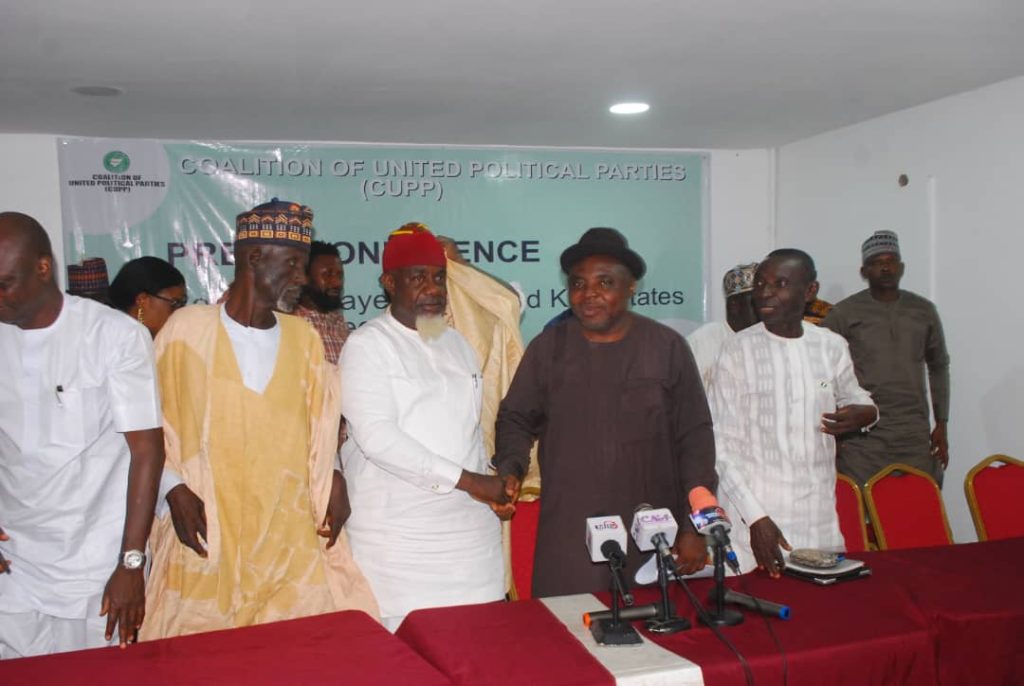..Says Kogi was the best in conduct and outcome”
The Coalition of United Political Parties has commended the Independent National Electoral Commission for upping its game in the just concluded off-cycle elections in Bayelsa, Imo and Kogi states in spite of the overwhelming challenges it had to cope with during the polls.
The CUPP said, as the foremost opposition group in the country, it was pertinent to give kudos to the umpire in situations where it deserved it just as the Coalition had knocked it for lapses in the past.
They said from the reports of the different observer groups and Non-Governmental Organisations working with the CUPP and others across the three states, the conduct and outcome of the election appeared to have been best in Kogi State.
The group said: “Overall, Kogi State appears to have been where the election was best in conduct and outcome.
“YIAGA Africa even confirmed in their reports that their Pre-election projections and the ultimate outcome in Kogi State substantially tally with INEC declarations”, they noted.
The Coalition leaders spoke at a press conference in Abuja, during the presentation of communique on the review of the off-season elections in Bayelsa, Kogi and Imo states, with the theme; ‘INEC, Nigerian elections and the rest of us’.
They also commended security agencies for the prompt arrests of individuals who were seen to pose security threats in the elections in the three states and their refusal to succumb to the blackmail of some political actors who had attempted to hamstring them in the performance of their constitutional duties of securing elections even before the election date.

Barrister Emeka Igwe,
Member, Steering Committee of the CUPP, who presented the communique on behalf of others who were also present at the press briefing, said reports by various observer groups and CUPP members on ground, especially party agents, showed that there was a great improvement in the early arrival of INEC officials and election materials at Polling Units “except in few places due to security and logistic factors”.
Part of the communique read, “After all said and done, INEC seems to have improved better in its affairs in conducting elections, judging by field reports. It is the other players in Nigeria’s elections who should sit up and play according to the rules. Reports of prompt attention to complaints and other emergencies by INEC are quite commendable.
“Among the three states, the results later announced by INEC appeared to be an overwhelming reflection of the votes cast by the people in both Kogi and Bayelsa states whilst serious questions and allegations have been raised on Imo State in the areas of voter intimidation, over-voting, vote buying and security breaches.
“Overall, Kogi State appears to have been where the election was best in conduct and outcome. YIAGA Africa also confirmed in their reports that their Pre-election projections and the ultimate outcome in Kogi State substantially tally with INEC declarations. (Kindly find attached the YIAGA Africa report).”
“We call on all relevant agencies to investigate all allegations with a view to doing the needful to instill public confidence in our elections,” the CUPP added.
On the issue of vote buying, it stated, “This sad phenomenon in our elections is one challenge that must be deliberately eliminated by constitutional means. For a long time now, INEC has been emphasising the negative effects of vote buying through its consistent election awareness/education campaigns but politicians have found a way to violate this law by compromising voters financially.
“In order to discourage and discontinue this bad behaviour, there must be a stringent criminalisation of the matter and enforcement.”
The Coalition, however, said the responsibility for a free, fair and credible election was that of everyone and not INEC alone, urging INEC to continue to improve in areas they are found wanting.

FULL TEXT:
Being The Text Of A Communique Presented By The Coalition of United Political Parties, CUPP, On Wednesday November 15th, 2023 At The Federal Capital Territory, Abuja.
INEC, NIGERIAN ELECTIONS AND THE REST OF US; CUPP’S REVIEW OF THE RECENTLY CONCLUDED OFF-CYCLE GOVERNORSHIP ELECTIONS IN THREE STATES
Fellow Nigerians, opposition CUPP leaders here present, ladies and gentlemen of the Press, it is our well considered decision to address issues regarding the recently concluded off-cycle governorship elections in the three states of Bayelsa, Imo and Kogi states as the foremost opposition group in Nigeria.
Every Nigerian craves free, fair, transparent and credible elections in this country. But to achieve that threshold of democratic maturity, we should never make the mistake of thinking that it can be done only by the election management body, in this case the Independent National Electoral Commission, INEC. It is fundamentally our collective responsibility as politicians, activists, NGOs, security agencies, INEC, the electorate and, most importantly, the general citizenry of the Federal Republic of Nigeria. We are all critical stakeholders in ensuring that we get our elections right at the earliest possible time.
It is a social and historical reality that there is no perfect election anywhere in the world. Even in the advanced democracies, there are still contentions and constestations about the outcome of elections. We are all witnesses to what happened in 2020 in the American presidential election when the incumbent President Donald Trump complained about being rigged out of the election and almost caused a constitutional crisis by not wanting to leave office and even allegedly instigating Americans against the American Congress. That’s the kind of stuffs we see in Africa but, alas, it happened in the United States of America. The only difference is that the sustainable American democratic institutions and constitution took care of the crisis. It is the same way that the Democratic Party complained of external interferences that allegedly gave victory to Donald Trump in 2016.
All these are indicators that democracy is an ever evolving phenomenon and still far from reaching that ideal state of perfection.
The recently concluded off-cycle governorship elections in Bayelsa, Imo and Kogi States have thrown up further issues and concerns that need critical evaluation and interrogation.
Generally, the Independent National Electoral Commission, INEC, seems to have upped its game inspite of the overwhelming challenges it had to cope with during the elections.
Staff and Materials Deployment:
Reports by various observer groups and our members on ground, especially Party agents, suggested that there was a great improvement in the early arrival of INEC officials and election materials at Polling Units except in few places due to security and logistic factors, like in Bayelsa State where there was an accident and abduction involving INEC staff which we will still address in the course of this media briefing. In this aspect of timely staff and material deployments, we can confidently estimate that INEC scored at least 80%.
Security: We could see that there was a lot of efforts in deploying security agents in large numbers across the three states. Unfortunately, we still saw situations of abduction of at least one INEC staff plus an accident in which a boat conveying voting materials and INEC personnel in Bayelsa State capsized. Among the three states, the security situation seems to be worst in Imo, but not at the scale it was predicted before the election.
Vote Buying: This sad phenomenon in our elections is one challenge that must be deliberately eliminated by constitutional means. For a long time now, INEC has been emphasizing the negative effects of vote buying through its consistent election awareness/education campaigns but politicians have found a way to violate this law by compromising voters financially.
By most of on-the-spot reports, while this happened far lesser in Kogi and Bayelsa states, this was more brazenly committed in Imo state. In order to discourage and discontinue this bad behaviour, there must be a stringent criminalization and enforcement. CUPP recommends, inter alia, that anyone found to have compromised voters after diligent investigation, should lose his/her office even if such a person has been sworn in.
This is why we say that you cannot put every responsibility for a free, fair and credible election on the INEC. Politicians must learn to behave within the ambits of the Electoral laws. It is not INEC that buys or sells votes. It is not INEC that snatches ballot boxes and papers. It has never happened that INEC hired thugs, et cetera. Therefore, the idea that the whole blame of electoral malfeasance be put on INEC must be discouraged. We must all endeavor to make INEC’s job easier by collaborative efforts and playing by the rules – both by candidates and the electorate.
General Overview and Recommendations:
After all said and done, INEC seems to have improved better in its affairs in conducting elections, judging by field reports. It is the other players in Nigeria’s elections who should sit up and play according to the rules. Reports of prompt attention to complaints and other emergencies by INEC are quite commendable. Among the three states, the results later announced by INEC appeared to be an overwhelming reflection of the votes cast by the people in both Kogi and Bayelsa states whilst serious questions and allegations have been raised on Imo State in the areas of voter intimidation, over-voting, vote buying and security breaches.
Overall, Kogi State appears to have been where the election was best in conduct and outcome. YIAGA Africa even confirmed in their reports that their Pre-election projections and the ultimate outcome in Kogi State substantially tally with INEC declarations. (Kindly find attached the YIAGA Africa report).
We call on all relevant agencies to investigate all allegations with a view to doing the needful to instill public confidence in our elections.
Security: We wish to recommend to the Nigeria Police and sister agencies to always be proactive in forestalling security breaches during our elections. We commend them for the prompt arrests of individuals who were seen to pose security threats in the last off-cycle elections in the three states and their refusal to succumb to the blackmail of some political actors who had attempted to hamstring them in the performance of their constitutional duties of securing our elections even before the election date.
There is still much room for improvement, no doubt, and we encourage them to continue engaging our election realities and develop the mechanisms for better election security.
Conclusion: It is our firm belief that with deliberate and concerted efforts of all stakeholders in the Nigerian project, our elections will continue to improve.
















